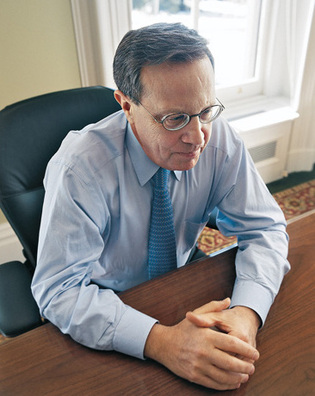 loading
loading
Q&A: Rick LevinThe economy hits YaleKathrin Day Lassila '81  Mark OstowView full imageY: For the first time in 20 years, Yale's endowment has taken a loss. In your December e-mail to alumni and staff, you estimated the loss at 25 percent. But it's reasonable for Yale's endowment to take a decline, or you'd have people looking for a Ponzi scheme. L: David Swensen [’80PhD, Yale's chief investment officer] has shown extraordinary ability to achieve superior returns during periods of strong financial markets. I think that by the time this recession is over we will see that he and his team are outstanding performers on the downside as well. Y: It's still a big hit. You've made some decisions about what Yale should do to cut back. L: The first principle is not to respond in a draconian way. For a start, our spending rule [regarding endowment income] gives us some time to adjust: as the endowment goes down, we only bear about 20 percent of the impact per year. Second, history tells us that following precipitous declines, markets tend to recover at least partway. Although no one can know for sure whether this is 1929 (a prolonged depression) or 1987 (a brief recession), it would be unfortunate to overreact. We will reduce expenses on non-faculty staff next year significantly, but not drastically. And we will make similar reductions in non-personnel expenses for each of the next two years. We may have to do more if the markets don't recover. Salary increases for faculty and management and professional staff will be significantly restrained. For the unionized employees, we have a contract for two more increases [totaling 5 percent] in January and July, and we will, of course, honor the contract. Y: You've named three areas to keep sacrosanct. What made you choose those as priorities? L: On financial aid, there has been a steady progression of more-generous financial aid and more-open access to this great institution over the last 40-plus years. The major changes we made last year in undergraduate financial aid are having the intended consequences. We're seeing significant increases in the number of low-income applicants. This is a step toward fulfilling the promise of America - allowing access to the most talented students in the country. We also increased aid to most middle-class families last year. To cut back, during a time when almost all families are going to be suffering, would not be good institutional or national policy. We created for ourselves a great opportunity by purchasing the West Campus. It allows us to increase our capability for important scientific discoveries, and it permits us to explore new ways of using and exhibiting our art, natural history, and library collections. Rather than put the West Campus on the shelf, we will proceed with the planning and move ahead, particularly in science, where state-of-the-art laboratories are already built and waiting to be occupied. Finally, we could have, like some other institutions, frozen our faculty hiring and tried to downsize our faculty. But we don't think the evidence at this point warrants that. We also think - with so many schools freezing hiring - that there will be opportunities to make some outstanding appointments. Y: You also mentioned New Haven. L: The mayor is understandably worried about sustaining the progress that's been made in the past 15 years, and we want to help him in whatever ways we can. We need to recognize that the city has been dependent on Yale; between Yale's tax contributions on its taxable properties [leased to commercial operations] and the building permits taken out each year for construction, the city gets substantial revenue. The city also depends on the state's PILOT program (Payments In Lieu Of Taxes), which helps make up the revenues cities lose from the presence of tax-exempt institutions. We need to bring persuasive arguments to the legislature to maintain or increase these PILOT payments to Connecticut's cities. Y: One might also argue that keeping the union employees at the same level of raises is a good move for the local economy. L: We wrote a contract with the unions back in 2003. It's been a good contract. I have no regrets. It has helped us build better relationships. But it would be unrealistic to expect that the next contract will be as generous. For one thing, the last contract achieved its objective of leaving our unionized workers in a highly competitive position in the region. Before the last contract, our employee benefits were better than those of most comparable employers, but in a certain range of clerical and technical jobs our wages were not. Now Yale's workers are in a stronger comparative position. Y: Has the economy affected Yale's capital campaign? L: Not surprisingly, our numbers are off their pace from last year. A lot of people with generous intentions are putting their plans on hold. Other donors who have made pledges are finding they have to slow down their payment schedule. We are telling our donors: whatever you can do, we appreciate your generosity. A pleasant surprise is that a few donors are still contemplating very large gifts for some of our highest priorities. Y: The capital campaign has generally been ahead of schedule. In June you raised the goal by $500 million, to $3.5 billion, to help fund two new residential colleges. L: We are still ahead of schedule. But it's a good thing we didn't raise the goal more!
The comment period has expired.
|
|